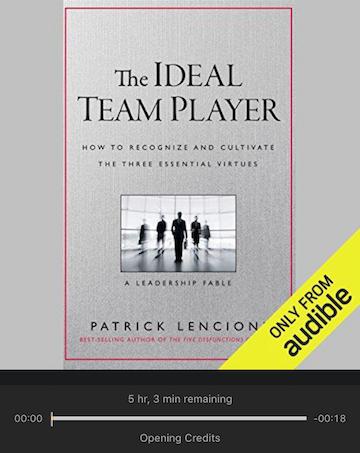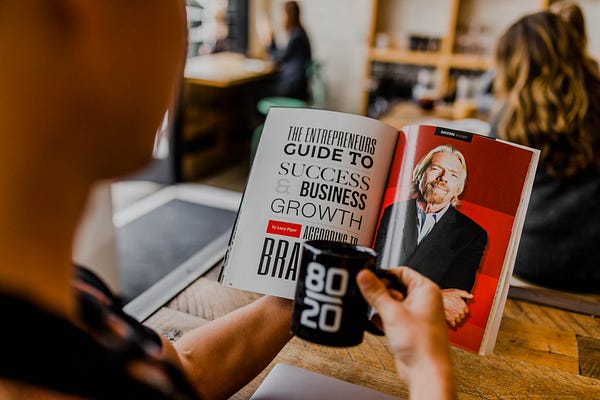The Ideal Team Player by Patrick Lencioni

After reading and greatly enjoyed another book by Patrick Lencioni, Death by Meeting (linked here), I thought that this type of book would be great to read through also as I continued to prepare myself for an upcoming professional role. Low and behold, shortly after finishing this book, I attained the professional role I was waiting for. This book was insightful and very important to me as I continue to strive towards becoming someone ready and able to lead a team.
The book focused on three virtues that an ideal team player encompasses:
1. Humble
2. Hungry
3. Smart
I don’t really think that this should be surprising. I was looking at a job at this payment-processing company in West Palm Beach, Florida a few months back and a little hesitant about the role from the jump. Once I got to the office, the staff was friendly, they all seemed pretty happy. Once I got further into the interview, the same things kept coming up with the people who worked there. They were all excited for the same reasons — the day ending early so they could go to happy hour. My oh my would I ever be miserable there. I want a job so I can work and work hard, I’m not interested in indulging in pleasure while working to achieve goals and desired outcomes.

The most unhappy people in companies are usually the people who don’t fit the company culture but are allowed to stay.
It’s necessary to have a conversation with those people and see if they are willing to become a team player or fitting for the culture. 95% of the time they’ll either change their behavior and love you for making them do it or they’ll opt-out on their own and they’ll be relieved.
Humble, the first virtue, means that people are quick to point out the contributions of others and slow to seek attention for their own.
I thought that Patrick hit the nail on the head when he shared the two types of people who generally lack humility. People who make everything about them are simply not willing to listen to other perspectives or ideas. Beyond that, people who lack self-confidence often do not assert themselves. If you put someone who makes everything about them in the same room as someone without self-confidence, what happens? Probably just the thing that the person who makes everything about them wants — unless nothing happens.
2 basic types of people who lack humility:
1. The overtly styles that people who make everything about them. Fosters resentment, division, and politics.
2. Lack of self-confidence so people mistake them as humble. C.S. Lewis addressed this when he said, “humility is not thinking less of yourself but thinking of yourself less.”
Hungry, the second virtue. Hungry people are always looking for more.
I have not encountered a large number of hungry people. However, that is one reason that I am already enjoying the company I started working at recently. A large number of people who I get to work alongside are surely quite hungry. I think that the last point the author makes here is essential to remember. There are many many examples of people who have fired their top performers in the company due to their selfish ambitions.
As the author continued, hungry people like more things to do, more things to learn, and more responsibility to take on. Hungry people almost never have to be pushed by managers to work harder because they are self-motivated and diligent.
It’s important to recognize when hunger is directed not for the good of the team but for the good of an individual in a selfish way, then they are not good for a team and unhealthy.
Smart, the final virtue. This refers to a person’s common sense about people.
There are differences between street smarts and book smarts; this type of smart centers around street smarts. I find it incredibly important to understand people. I find it even more important to have the ability to understand how people are reacting to certain things and why.

Has everything to do with interpersonally appropriate and aware. Smart people tend to know what is happening in a group situation and how to deal with others in the most effective way. They just have good judgment and intuition around the subtleties of group dynamics.
Along with the audiobook, the author shared a lot of questions that we can ask in an interview to try to identify if a candidate encompasses the qualities of humble, hungry, and smart. I really appreciated the questions and thought that they were all great and incredibly effective and a great understanding of how a person is — at least as good as an interview can be. I love the last question, it’s very important that we’re aware of the body language of the individual as they go about describing the person they believe is better than they are in an area. Along with that, I’d continue with a followup question and see if they become defensive in any way.
For the hungry questions, I think that the second is a little tough for some people to answer — we all enjoy different things in our free time and I don’t always believe that our hobbies are a great signifier of how hard we’ll work for a company. For me, I like the first question. Once we understand that, it’s all about igniting passion.
For the questions about smarts, I particularly liked, “What kind of people annoy you the most, and how do you deal with them?” Usually, I think that body language again, will play a huge role in the way that people we are interviewing will communicate with us. If people tense up, that is generally a signifier that they are uncomfortable, people who remain relaxed may be more easy-going and understand people better. However, that is not always a true tell and sometimes people may be displaying those things because they are in the interview. A great book by Joe Navarro, What EveryBODY is Saying, goes much more into detail on this topic (linked here).
Questions for an interview to see if someone:
Is humble:
Describe your current team. What do you like and dislike?
What are the most important accomplishments of your career?
What was the most embarrassing moment in your career? Or the biggest failure?
How did you handle that embarrassment or failure?
What is your greatest weakness?
How do you handle apologies, either giving or accepting them?
Can you tell me about someone who is better than you in an area that really matters to you?
Is hungry:
What is the hardest you’ve ever worked on something in your life?
What do you like to do when you’re not working?
What was your work ethic like as a teenager?
What kinds of hours do you generally work?
Is smart:
Have you ever worked with a difficult colleague or boss? How did you handle the situation?
How would you describe your personality?
What do you do that others in your personal life might find annoying?
What kind of people annoy you the most, and how do you deal with them?
Would your former colleagues describe you as an empathic person? -OR- Can you give an example of how you’ve demonstrated empathy to a teammate?
More detail at: https://www.tablegroup.com/books/ideal-team-player
Love this. I think that it is entirely important to check references. There are various ways to do this but one thing that I would look at in today’s world is social media activity. The way that people are responding to a candidate on social media should provide a general picture of someone’s interactions and if they are a good fit within the company culture. For me, I love growth and an ideal culture emphasizes growth, but that’s not for everyone.

Reference checks — used to ensure culture fit. A reference must know they’re not holding the future of someone in their hands. They must know everything will be kept confidential and that they aren’t the only person providing input. Look for specifics and focus on areas of doubt. Pay attention to references who do not respond, ask what others would say about them.
There were next some great questions to help assess people already within the team. I found that these are some of the best questions to ask to understand if someone is truly a good fit within the company culture and can do what is expected of them. What the author suggested to do is to count how many times you answer “usually” for each section. If there are 5 or 6 questions answered with usually then that’s usually a pretty good indicator that the person under assessment is usually those things. I challenge everyone reading this to take a look at the following questions and assess your direct reports as well as the person(s) you directly report to. While this may not be your company culture, it would at least provide a better picture of who they are.
Here are some ways that a manager can assess if someone is humble, hungry, or smart. Answer each by stating if your employee usually, sometimes, or rarely does these things.
HUMBLE MY DIRECT REPORT…
1. Compliments or praises teammates without hesitation.
2. Easily admits to mistakes.
3. Is willing to take on lower-level work for the good of the team.
4. Gladly shares credit for team accomplishments.
5. Readily acknowledges his/her weaknesses.
6. Offers and accepts apologies graciously.
TOTAL HUMILITY SCORE: ______
HUNGRY MY DIRECT REPORT…
7. Does more than what is required in his/her own job.
8. Has passion for the “mission” of the team.
9. Feels a sense of personal responsibility for the overall success of the team.
10. Is willing to contribute to and think about work outside of office hours.
11. Is willing to take on tedious or challenging tasks whenever necessary.
12. Looks for opportunities to contribute outside of his/her area of responsibility.
TOTAL HUNGER SCORE: ______
SMART MY DIRECT REPORT…
13. Generally understands what others are feeling during meetings and conversations.
14. Shows empathy to others on the team.
15. Demonstrates an interest in the lives of his/her teammates.
16. Is an attentive listener.
17. Is aware of how his/her words and actions impact others on the team.
18. Adjusts his/her behavior and style to fit the nature of a conversation or relationship.
TOTAL SMART SCORE: ______
Next, the author instructed us to do a self-assessment with the same questions and just switch out “I” for the pronouns. I have found that when doing a self-assessment, these questions are great and specific enough that they make me think and truly be honest and also simple enough that they can be answered fairly quickly.
Self-assessment, identifying areas of improvement and determining if we are an ideal team player. Ask the same questions as above just in the “I” form of the questions.
I love this. For me, it’s smart then hungry then humble. I don’t want to say I’m not humble I’m just much more aware of my surroundings and addicted to the end result than anything else. Confidence exudes me because I see potential when others don’t — which in my mind connects directly to being smart.
An alternative approach: ask everyone to rank the virtues for themselves. They share the one they feel they demonstrate most clearly followed by the second and the third.

They will opt out OR get better on their own. It’s not something that we can lead them to, they need to make the decision on their own. I think that it is incredibly important to simply dedicate the time to having these types of conversations. Simple things like explaining expectations for deliverables and desired outcomes need to be discussed. If someone is expected to fit into a culture but does not understand what the culture encompasses.
For someone to improve we must constantly repeatedly constantly tell the employee they need to get better. We must hold them accountable. They’ll almost always get better or opt out on their own.
This is the basis of another book of Patrick Lencioni’s and one that I have not read yet but definitely one that I look to work through in the future and learn from. Most of these team dysfunctions seem pretty straightforward to me but I am interested to see what else the author has to add to them when I do read the book.
The five dysfunctions of a team:
1. Absence of trust
2. Fear of conflict
3. Lack of commitment
4. Avoidance of accountability
5. Inattention to results
Love this. Love love love this. People often forget this and don’t pay enough attention to the smaller details before they advance to levels with greater responsibility.
Humility is the greatest of all virtues and the antithesis of pride — the root of all sin as the Bible says.

Overall I liked this book and thought that the way it was explained was, again, great. As is characteristic of Patrick Lencioni, he made it more of an interactive story and then provided deeper-level education in the second half of it. I had not thought deeply about what it means to be humble, hungry, and smart I just knew that those three things describe me fairly well. Now that I have a deeper understanding of key actions that display the presence, or lack thereof, of those characteristics, I feel confident that I will be able to also increase my contributions to teams. Learning is always something I enjoy — I’m hungry for it.
I gave this book a 4/5